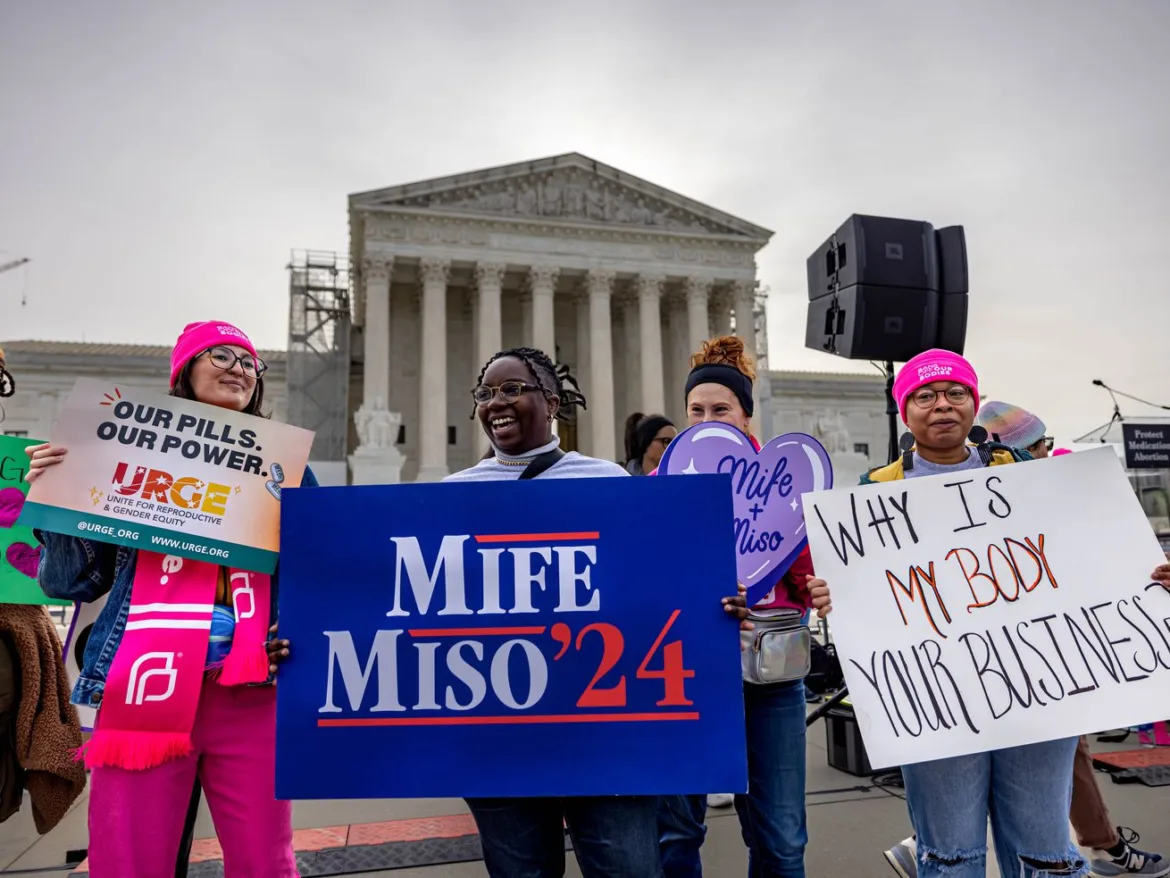The judges aren’t done.
The attacks on legal abortion in the last two weeks alone have been staggering.
Since the beginning of April, state Supreme Courts in Florida and Arizona have both issued rulings that will effectively ban abortion care in the third and 14th most populous states.
While both states already had curtailed abortion after the overturn of Roe v. Wade, now Florida’s Supreme Court ruling will trigger a six-week ban (before many people know they’re pregnant) beginning on May 1. And Arizona’s Supreme Court revived a near-total ban that will take effect in two weeks and carries with it a minimum two-year prison sentence for doctors who perform abortions that are not essential for saving their patient’s life.
It’s perhaps fitting that these extreme rulings would come down at the same time that former President Donald Trump attempts to wipe his hands clean of abortion policy in his 2024 presidential campaign.
Earlier this week Trump released a four-minute video saying he was “proudly the person responsible” for ending Roe v. Wade, but that he now supports states determining abortion policy “by vote or legislation or perhaps both.” Trump insisted that “at the end of the day it’s all about the will of the people.”
Except that’s clearly not true.
The American people never supported overturning Roe v. Wade. Abortion policy in the US has been clearly out of step with the will of the people over the last two years, and the judicial system has helped keep it that way.
This week’s abortion rulings were not unpredictable
The new rulings in Florida and Arizona are only the latest examples of how access to reproductive freedom continues to be restricted by far-right judges appointed by Republicans.
In Florida, Republican Gov. Ron DeSantis appointed five out of seven justices to the state’s Supreme Court (and 115 judges in total) while all seven justices in Arizona were also appointed by Republican governors.
Let’s not forget the Alabama state Supreme Court decision in February that invoked God to claim that frozen embryos count as “children” under state law. This “fetal personhood” ideology is being promoted by other judges too, like in Florida, where the state’s Chief Justice Carlos Muñiz recently suggested that abortion “take[s] a whole class of human beings and put[s] them outside the protection of the law.” Six of the seven Florida justices signaled they’d be open to a future fetal personhood case there.
(Republican politicians have sought recently to distance themselves from court attacks on IVF and abortion, but over 120 House Republicans are currently co-sponsoring federal legislation to give constitutional rights to embryos.)
These are state-level decisions, the result of state GOP politicians’ appointments. But judges on the federal bench have also used their positions to restrict abortion rights. Trump’s appointment of Judge Matthew Kacsmaryk to a federal district court in Texas, for example, led to the brazen effort to restrict medication abortion nationwide. Two more Trump-appointed judges on the Fifth Circuit Court of Appeals also ruled in favor of restricting access to the abortion pill.
As Slow Boring writer and Vox co-founder Matt Yglesias recently wrote, one of the biggest risks to abortion rights should Donald Trump win in November is that the judiciary will move even further to the right. Trump may say he’d let the states decide, but the judges he’d likely appoint wouldn’t — and there would be no recourse, as Yglesias wrote: “The whole point of the federal judiciary in the United States is that judges are insulated from electoral accountability and free to hand down whatever kind of nutty rulings they want.”
Slate writers Dahlia Lithwick and Mark Joseph Stern made a similar point this week, observing how anti-abortion lawyers plan to use the Comstock Act, an 1873 law that hasn’t been enforced in nearly a century, to ban medication abortion nationwide. Far-right judges, they note, can help make that possible by greenlighting legally absurd interpretations.
“[Anti-abortion lawyers] tell us that they intend to stay quiet about this [Comstock] scheme until after the election,” Lithwick and Stern write. “The plot is similar to what just happened in Arizona: Republicans enacted a seemingly moderate 15-week ban, only to stand by and watch as their colleagues on a GOP-packed court resuscitated a total ban passed during the Civil War.”
/cdn.vox-cdn.com/uploads/chorus_asset/file/25384863/1408593932.jpg)
John Parra/Getty Images for MoveOn
Voters have a chance to fight back — somewhat
Voters in Florida and Arizona both will likely have the chance to vote to protect abortion rights this fall.
Florida’s ballot measure, which would require (a pretty formidable) 60 percent of voters to pass, would protect abortion access up to 24 weeks. Arizona’s ballot measure, which is not yet formally on the November ballot, would also protect abortion up to 24 weeks but would only require a simple majority to pass.
These will be expensive, competitive fights — even as we know voters in these states support access to legal abortion. More than two-thirds of Floridians say abortion should be legal in all or most cases, and in Arizona, 59 percent of registered voters say abortion should be mostly or always legal. This doesn’t mean all those people will turn out to vote, though.
Even if these ballot measures do pass, there is no guarantee the “will of the people” will be respected.
In Ohio, for example, after 57 percent of voters cast ballots in 2023 to protect abortion rights, Republican lawmakers immediately started plotting ways to undermine the results, including by threatening to place another referendum on the ballot in the future.
More broadly, though, state protections can only go so far.
Even if Florida voters were to protect abortion access, pregnant women in Texas would still have to fear dying of sepsis, or Alabama families might still have to pay much higher costs for fertility treatments. Americans want federal standards for reproductive rights, not a patchwork of state laws that leave people vulnerable.
This story appeared originally in Today, Explained, Vox’s flagship daily newsletter. Sign up here for future editions.



